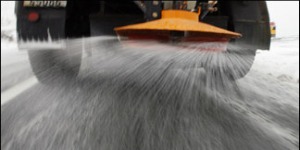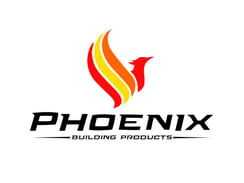When choosing a deicer, there are a number of things to consider, including cost, long term effects, and effectiveness. It’s important to know what your deicing agent is composed of, and to keep in mind that the cheapest isn’t always the most effective. What you choose will vary depending on what type of area you are applying your agent to, the predicted drop in temperature, and maybe your own personal preference.

Rock Salt
One of the most commonly used deicers is rock salt. These irregularly shaped sodium chloride crystals are effective in temperatures as low as 20 degrees and is relatively inexpensive. If used in high concentrations, rock salt can build up in soil and cause permanent damage to vegetation. Rock salt is corrosive towards metals, but will not chemically harm concrete. Rock salt will leave a white powdery residue on clothing when dry, and becomes less and less effective in temperatures below freezing. Rock salt is commonly used on highways in combination with liquid calcium chloride.
Calcium Chloride
Calcium chloride is available in liquid, flake, or pellet form. Corrosive to metal, calcium chloride is more costly than rock salt but requires less frequent applications, making it a cost effective choice. When calcium chloride turns to liquid, it gives off heat. Peladow calcium chloride pellets are one of the fastest-acting agents to melt snow and ice. Effective in temperatures way below zero, calcium chloride pellets give off heat when dissolving, which helps the ice melt faster at lower temperatures. Calcium chloride pellets won’t chemically attack concrete, making it ideal on the use of roads or highways. In addition, when used as directed calcium chloride pellets won’t harm vegetation and doesn’t leave any powdery residue. Peladow calcium chloride flakes do not give off as much heat as pellets, but are also fast-acting. Calcium chloride flakes are commonly mixed with sand, salt, or other abrasive material for use on snow and ice. Similar to calcium chloride pellets, calcium chloride flakes won’t leave a powdery residue, do not harm concrete or pose a threat to vegetation.
Urea and Potassium Chloride
Urea and potassium chloride are both endothermic, meaning instead of giving off heat, heat is absorbed. Both of these agents are considered to be the safest to use around vegetation, however start to become ineffective at 20 degrees Fahrenheit, making them less effective in lower temperatures. Both agents leave a powdery residue and have a higher application rate. Since urea does not contain chlorides, it is not corrosive and is commonly used in areas where chloride can’t be used, such as airports or elevated walkways.
Magnesium Chloride
Magnesium chloride contains 50% water. Magnesium chloride starts out working at the same speed as calcium chloride, but can become diluted and be less effective. Working in temperatures as low as 5 degrees Fahrenheit, and effecting concrete chemically at a slow rate, magnesium chloride is far less corrosive than rock salt. Liquid magnesium chloride is used on highways, adhering to the road and preventing the formation of ice.
Sodium Acetate and CMA
Sodium acetate is used on airport runways as a solid deicer, being FAA approved. Sodium acetate gives off heat like calcium chloride, but is faster and more efficient. It works longer and doesn’t require as many applications. Both sodium acetate and chloride magnesium acetate (CMA) work in temperatures as low as 0-5 degrees. Turning snow and ice into a slushy mix, these deicers are not ideal for walkways. CMA prevents snow and ice from sticking to surfaces, as well as to each other. Biodegradable, CMA is often used on roads, bridges, and parking surfaces. Combined with salt, CMA is used as a corrosion inhibitor.

It's not too early to start preparing for colder temperatures and all that winter brings! Contact us for your winter deicing product needs.

You May Also Like...













